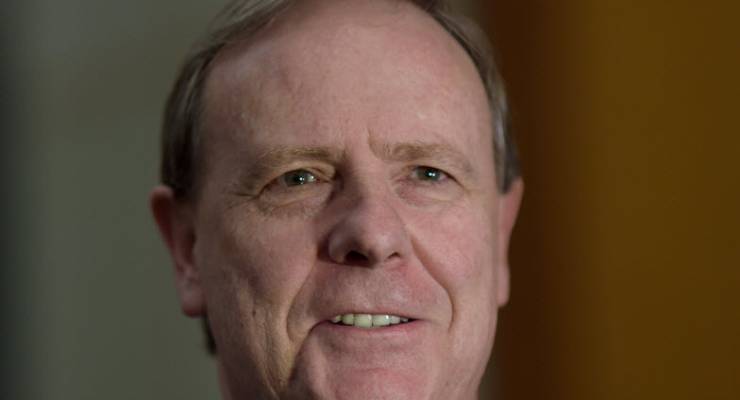
Given the last few weeks have marked 10 years since the onset of the global financial crisis, media outlets have been acknowledging the anniversary with thinkpieces and recountings of the events that precipitated, in most of the developed world, the deepest recession since the 1930s.
Locally, then-treasurer Wayne Swan and then-UK cabinet minister Ed Balls have been on a speaking tour talking about both the handling of the crisis and the lessons learnt from it in the context of the global debate about inequality. The Financial Review has also marked the anniversary with a couple of thinkpieces from offshore. But at The Australian they’ve made the bizarre decision to interview Peter Costello “to mark 10 years since the beginning of the global financial crisis”.
Now, true, Costello was treasurer for the very start of the crisis, but devoted most of that time to the Liberal leadership issue. That wasn’t resolved until Costello (yet again) dogged it and decided not to knock off John Howard despite the Liberals having a collective and embarrassingly public mid-APEC conniption that Howard was going to be flogged by Kevin Rudd. And in any event, he was sent into opposition in November that year.
[The surprisingly quick death of neoliberalism in Australia is underway]
But it pays to remember that, when he departed politics two years later — thus relinquishing what would almost certainly have been the opportunity to replace Malcolm Turnbull and defeat Rudd in 2010 to win the prime ministership in his own right — Costello said that he would not have undertaken any economic stimulus in response to the financial crisis. Instead, he said he would have left the whole matter to the “automatic stabilisers” — that is, allow declining tax revenue and rising unemployment benefits to increase the amount of stimulus into the economy (or reduce the amount being taken out, given we were starting from Costello’s budget surplus).
One suspects that, had Howard won in 2007, there would have been oodles of stimulus spending — by that stage, as Costello accurately recounted in his memoir, Howard had become absurdly profligate. But we’ll never know, so we’ll take Pete at his word that stimulus spending in response to the greatest economic crisis in 70 years was a no-no. And for that matter, he still wants to litigate the whole issue of stimulus spending by calling for a “a formal, absolutely honest audit” of the Rudd government’s stimulus program.
[Enough with the fetishism of the Hawke-Keating years]
That’s the program that, despite crooks exploiting the poorly designed Home Insulation Program component that led to several deaths, succeeded in keeping recession at bay and unemployment below 6% when other countries plunged into years-long contractions and double-digit unemployment. Maybe Costello agrees with business figure Elmer Funke Kupper that it’s “almost a shame … [that] we didn’t have a deeper downturn to wake us up.”
That sentiment is reinforced by Costello’s latest policy brainwave: he wants the Reserve Bank to lift interest rates. This, of course, would put upward pressure on the dollar, but Costello dismisses that. “[T]hat’s not one of their goals. Nowhere in the Reserve Bank framework does it mention currency.” That will likely come as a shock to the RBA: section 10(2) of the RBA Act says it’s a duty of the board to use its powers in a way that will “best contribute to:
(a) the stability of the currency of Australia;
(b) the maintenance of full employment in Australia; and
(c) the economic prosperity and welfare of the people of Australia.”
The bank also has an agreement with successive treasurers to target monetary policy to achieve an inflation rate 2–3%, on average, over time. Given inflation is currently 1.8% using the bank’s preferred measures, and given we’re still well short of full employment, Costello appears simply to like the idea of punitive rate hikes for their own sake.








This – Costello – is the financial genius that took us from a sensible CGT regime of a tax base of 100% of real CGs to a tax base of 50% of nominal gains, thus overnight making negative gearing an issue.
Elmer Funke Kupper !!
Is that a real name or something made up?
Whatever, I hope Elmer doesn’t Funke anything Kuppe
I dare say Costello is offering himself to lead the audit. It would be better just to pay him to go away – except we have already done that with his Parliamentary pension.
Costello and imbecile, go together like horse and carriage …….
Sing it with me.
Howard ploughed that barren furrow under Fraser, Costello continued dutifully under Howard then Hockey and Morrison have followed – look where we are now – peering over the parapet of economic detritus to a field of deliberately avoided and missed opportunity – abandoned in the pursuit of some phantasmagorical ideology.
This from the “national treasure”/clown that had a contest with Howard to see who could piss the proceeds of the mining boom highest up the wall of political expediency and cut tax revenue – rather than invest in infrastructure?
We are “living” his legacy of almost 12 years of missed and evaded opportunity.
After being Howard’s “jester bitch” for 12 years he found his guts enough to rewrite history – pity there are so many embarrassing facts out here contradicting his version of it … which makes him a Howard imitation in that too?